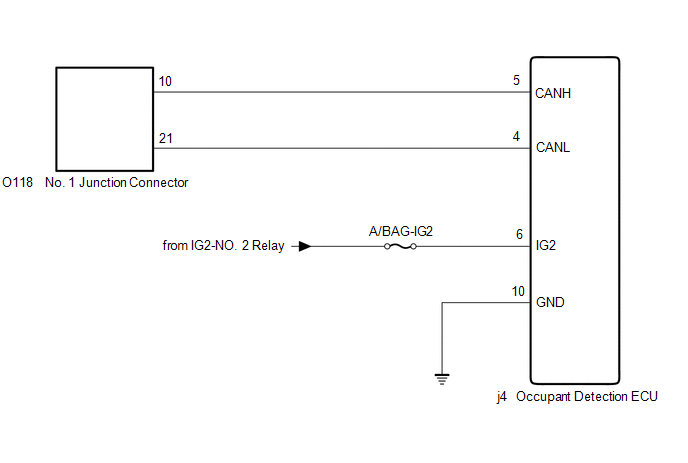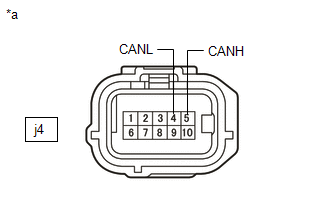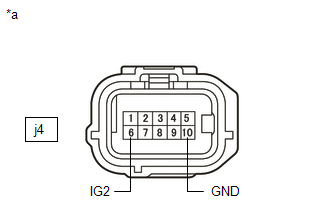- Communication stop for "Occupant Detection" is indicated on the "Communication Bus Check" screen of the Techstream.
- Communication stop history for "Occupant Detection" is indicated on the "Communication Bus Check (Detail)" screen of the Techstream. (The Lost Communication Time value for "Occupant Detection" is 6 or more.)
- Communication system DTCs (DTCs that start with U) that correspond to "Restraints Occupant Classification System Module Communication Stop Mode" in "DTC Combination Table" are output.
| Last Modified: 07-31-2024 | 6.11:8.1.0 | Doc ID: RM1000000026K07 |
| Model Year Start: 2023 | Model: GR Corolla | Prod Date Range: [09/2022 - 11/2022] |
| Title: NETWORKING: CAN COMMUNICATION SYSTEM (for Gasoline Model except TMC Made): Restraints Occupant Classification System Module Communication Stop Mode; 2023 MY Corolla Corolla Hatchback GR Corolla [09/2022 - 11/2022] | ||
|
Restraints Occupant Classification System Module Communication Stop Mode |
DESCRIPTION
|
Detection Item |
Symptom |
Trouble Area |
|---|---|---|
|
Restraints Occupant Classification System Module Communication Stop Mode |
Any of the following conditions are met: |
|
WIRING DIAGRAM

CAUTION / NOTICE / HINT
CAUTION:
When performing the confirmation driving pattern, obey all speed limits and traffic laws.
NOTICE:
- Because the order of diagnosis is important to allow correct diagnosis, make sure to begin troubleshooting using How to Proceed with Troubleshooting when CAN communication system related DTCs are output.
- Before measuring the resistance of the CAN bus, turn the ignition switch off and leave the vehicle for 1 minute or more without operating the key or any switches, or opening or closing the doors. After that, disconnect the cable from the negative (-) battery terminal and leave the vehicle for 10 minutes or more before measuring the resistance.
-
When disconnecting and reconnecting the battery.
HINT:
When disconnecting and reconnecting the battery, there is an automatic learning function that completes learning when the respective system is used.
- Some parts must be initialized and set when replacing or removing and installing parts.
-
After performing repairs, perform the DTC check procedure and confirm that the DTCs are not output again.
DTC check procedure: Turn the ignition switch to ON and wait for 1 minute or more. Then operate the suspected malfunctioning system and drive the vehicle at 60 km/h (37 mph) or more for 5 minutes or more.
- After the repair, perform the CAN bus check and check that all the ECUs and sensors connected to the CAN communication system are displayed as normal.
- Inspect the fuses for circuits related to this system before performing the following procedure.
HINT:
- Before disconnecting related connectors for inspection, push in on each connector body to check that the connector is not loose or disconnected.
- When a connector is disconnected, check that the terminals and connector body are not cracked, deformed or corroded.
PROCEDURE
|
1. |
CHECK FOR OPEN IN CAN BUS LINES (OCCUPANT DETECTION ECU BRANCH LINE) |
(a) Disconnect the cable from the negative (-) battery terminal.
(b) Disconnect the j4 occupant detection ECU connector.
|
(c) Measure the resistance according to the value(s) in the table below. Standard Resistance:
|
|
| NG |

|
REPAIR OR REPLACE CAN BRANCH LINES OR CONNECTOR (OCCUPANT DETECTION ECU) |
|
|
2. |
CHECK HARNESS AND CONNECTOR (POWER SOURCE CIRCUIT) |
|
(a) Measure the resistance according to the value(s) in the table below. Standard Resistance:
|
|
(b) Reconnect the cable to the negative (-) battery terminal.
(c) Measure the voltage according to the value(s) in the table below.
Standard Voltage:
|
Tester Connection |
Condition |
Specified Condition |
|---|---|---|
|
j4-6 (IG2) - Body ground |
Ignition switch ON |
11 to 14 V |
| OK |

|
| NG |

|
REPAIR OR REPLACE HARNESS OR CONNECTOR (POWER SOURCE CIRCUIT) |
|
|
|
![2023 MY Corolla Corolla Hatchback GR Corolla [09/2022 - 11/2022]; NETWORKING: CAN COMMUNICATION SYSTEM (for Gasoline Model except TMC Made): PROBLEM SYMPTOMS TABLE](/t3Portal/stylegraphics/info.gif)


